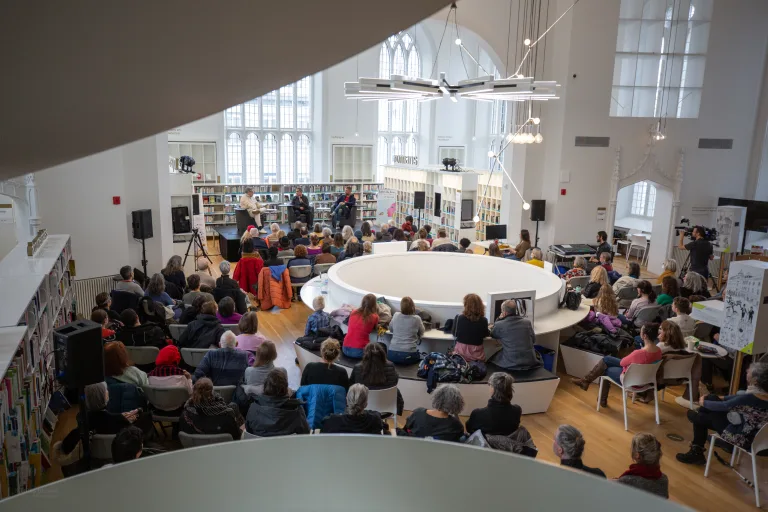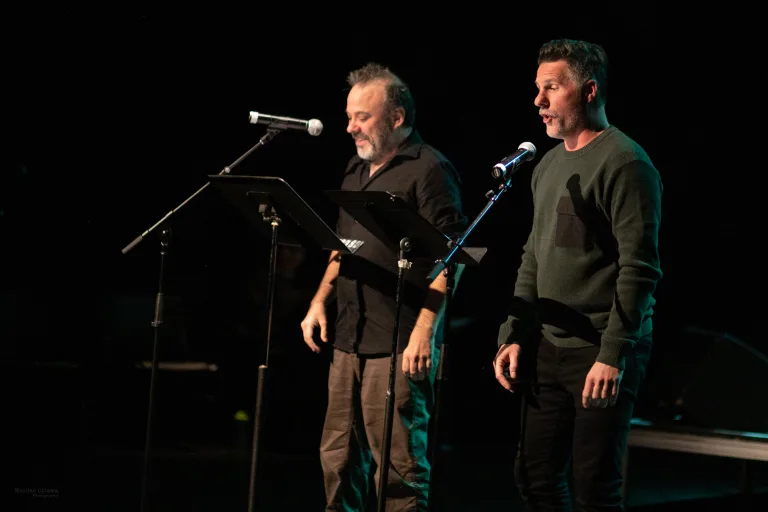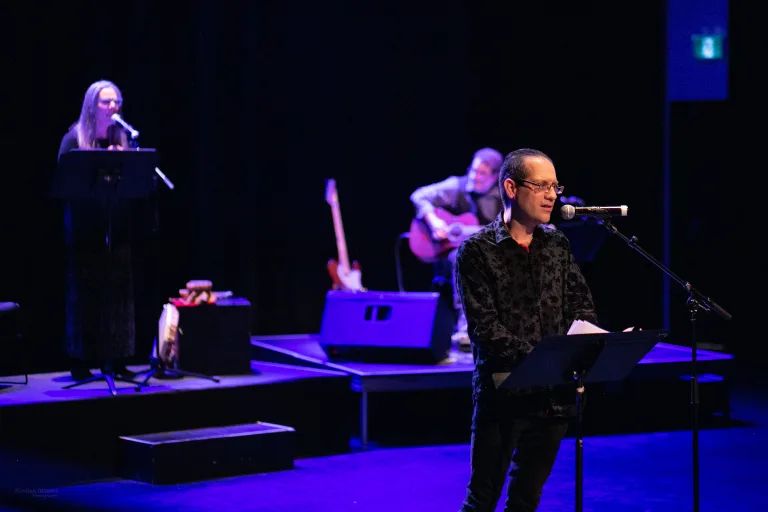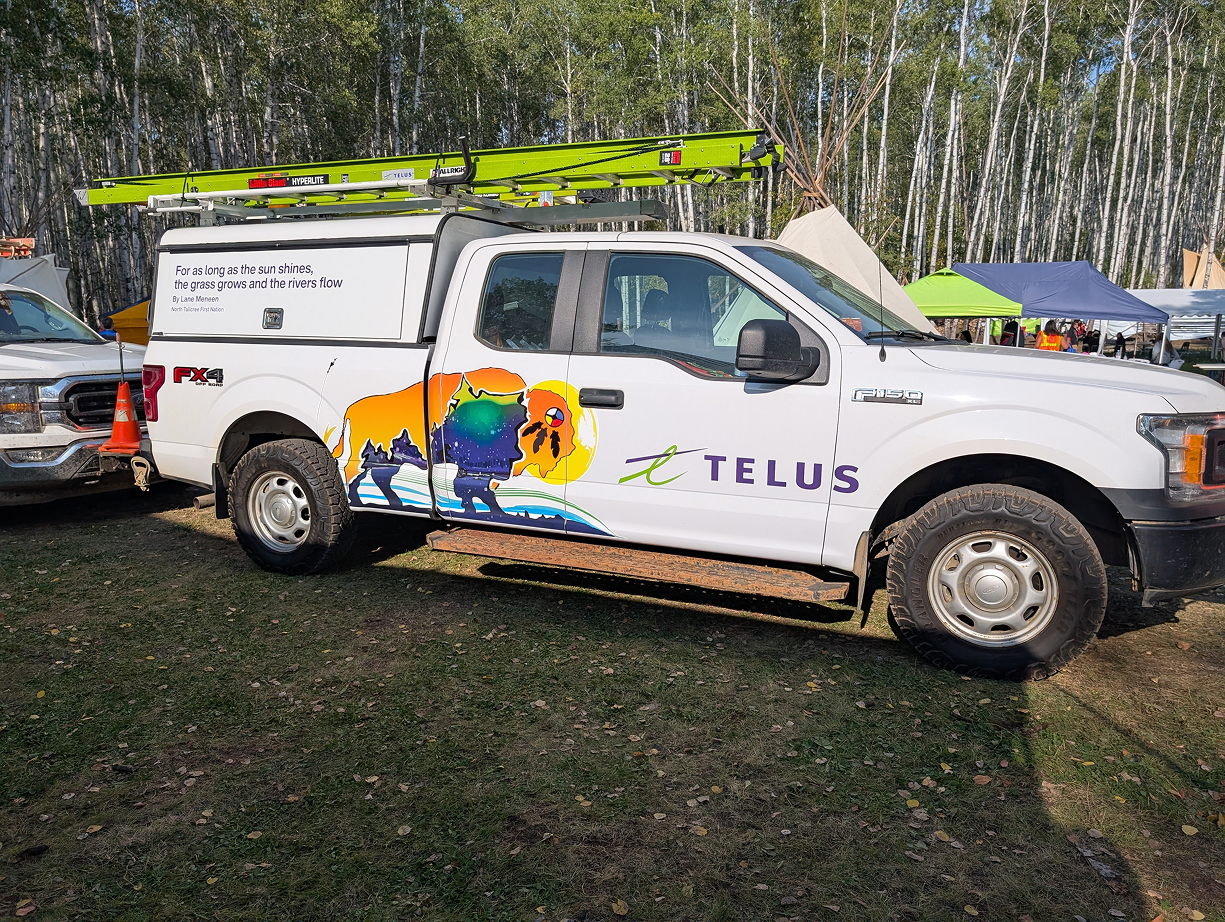
Reconciliation
Elevating Indigenous voices through literature
May 31, 2023
Photo: Nicolas Ottawa/Kwahiatonhk!
Presented by TELUS, the Salon du Livre des Premières Nations (SLPN), or First Nations Book Fair, showcases the best in Indigenous writing. It’s an open invitation to discover the rich culture of First Nations.
Indigenous writing, among other artworks, is experiencing newfound attention these days, in the wake of Indigenous-led grassroots events that have led to a groundswell of support for truth and Reconciliation across Canada. The term Indigenous encompasses all Indigenous Peoples, including Inuit and Métis People.
“I’m seeing more and more interest in Indigenous culture these days. Non-Indigenous people in Quebec and across Canada are interested in what we have to say,” says
Louis-Karl Picard-Sioui,
a member of the Huron-Wendat Nation and author, historian, anthropologist, and director of Kwahiatonhk!
(We write! in the Wendat language), a non-profit organization that promotes Indigenous authors and books.It wasn’t always like this.
Fifteen years ago, the publishing industry was reluctant to give Indigenous authors the visibility they not only deserved, but also needed for their words to find an audience. It’s why, in 2011, the Salon du Livre des Premieres Nations (SLPN) was created, specifically to elevate Indigenous voices.
“There was really a desperate need. We had to create our own infrastructure because Indigenous authors didn’t feel that their identities and interests were reflected in the Quebec literary events that existed at the time,” explains Picard-Sioui, who’s been involved in organizing the SLPN since its third edition and is, himself, the author of several award-winning books, including his latest novel,
Éveil à Kitchike : la saignée des possibles
.Today, the SLPN remains Canada’s biggest Indigenous literature event celebrating Indigenous literature.
More than 3,000 readers participated at the 2022 SLPN last November, onsite in Quebec City and online, which offers an opportunity to meet Indigenous nation-wide authors at round-table sessions and book signings. A series of performances were presented, including Kwatendotonnionhk (Our stories) which allowed audiences to explore legends through stories, poetry, singing and instrumental pieces.
“First Nations literature is evolving and diversifying. It’s being read and acknowledged, and the public is connecting with it. Today, it addresses a broad range of issues and takes many forms. Poetry, fiction, legends, multimedia – we’re seeing a real explosion of styles,” says Picard-Sioui.
Reconciliation: Stories of truth

Photo: Nicolas Ottawa/Kwahiatonhk!
Author, actor and theatre professional
Jocelyn Sioui
, from the Huron-Wendat Nation, one of Quebec’s first Indigenous puppeteers, participated at the SLPN. Through his participation and dedication, he seeks to make the voices of Indigenous Peoples heard in all their diversity.“At the start of my career, I never considered making Indigenous art. Projects that were proposed to me were too often associated with a certain folklore. Today, there’s an explosion of different styles, and it’s that diversity of voices and styles that the SLPN aims to highlight,” Sioui explains.
Sioui now uses his art to explore both his own identity and his Indigenous roots.
He strongly believes that to close the divide that separates First Nation Peoples from the rest of Canada, we will need to “repair our stories.”
His play,
Mononk Jules
, currently on tour in Canada, reconstructs the story of his uncle, Jules Sioui, a Wendat community member who left his mark on Canadian history but was then thoroughly forgotten by both his family and by history.“Quebecers have become more sensitive to the realities of Indigenous people’s lives because they’ve been moved by certain stories, like the ones relating to the residential schools and the impacts of the Indian Act. Back in my day, we barely talked about these stories in our history classes at school. But it’s important to name these events. As more people are exposed to the truth, public opinion will have more of an influence on political decisions. That’s what will allow us to make progress with Reconciliation,” Sioui adds.
Art has the power to heal
History has long been written and told by non-Indigenous people, a legacy of the colonial past. For many years, the non-Indigenous belief that writing is more reliable than speech, together with policies like the Indian Act, have threatened traditional methods of knowledge transmission and oral history.
Dave Jenniss
, who is of Wolastoqey origin, an actor, director, playwright and scriptwriter, notes that at a certain point in his life, he was disturbed by the absence of Indigenous voices in the public space. Artistic director of Ondinnok Productions
, he relies on theater to revive memories and leave a mark for the future generations of Indigenous artists. He is known for his touchingly honest writing, nourished by his Indigenous roots.“More non-Indigenous People are coming to the Salon. For me, that's a form of Reconciliation in itself. Non-Indigenous communities will need to take the time to talk to and understand Indigenous people before we can really think of Reconciliation,” he adds.
“Art has the power to heal. It allows us to break the cycle of ignorance and change a painful history by uniting our voices.”
Write the possibilities of the future
Corporations have an important role to play in supporting Indigenous arts and encouraging Reconciliation.
It’s why some have stepped up with firm commitments to Indigenous Reconciliation, including TELUS, a primary sponsor of the SLPN. The company recently published the fourth edition of its
Indigenous Reconciliation & Connectivity Report
, a document that amplifies Indigenous voices and the remarkable outcomes Indigenous communities are driving, and was the first technology company in Canada to launch a Reconciliation action plan
. These commitments also aim to raise public awareness and are based on Indigenous frameworks of Reconciliation, including the 94 calls to action
of the Truth and Reconciliation Commission, the United Nations Declaration on the Rights of Indigenous Peoples
and the 231 Calls to Justice
.
Photo: Nicolas Ottawa/Kwahiatonhk!
“It’s encouraging to see a company like TELUS develop a policy like this, and we hope that others will follow suit,” says Picard-Sioui.
“Reconciliation starts with acknowledging the facts, and we still have a lot of work to do in Quebec, starting with the history that’s taught here. Indigenous voices should be able to join in. That’s what will allow us to write the possibilities of the future.”
To experience the highlights of the Salon du Livre des Premières Nations, including four dedicated podcasts, visit the event website at
kwahiatonhk.com
. Author interviews are available on the Salon’s Facebook page. 
Meet the author
TELUS – Indigenous book fair


